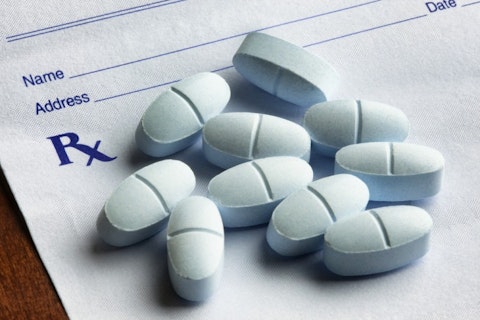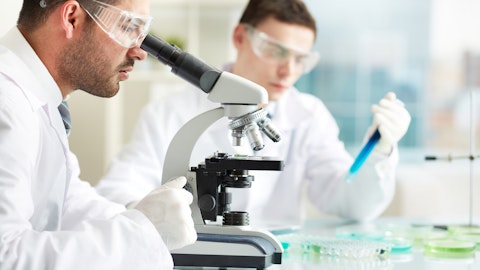The massive upswing in antibiotic use over the last three decades is causing well documented problems. Perhaps the most widely discussed is antibiotic resistance, and of this subject, one of the most widely discussed areas is the Clostridium difficile infection, or C. diff colitis.
C. diff colitis is a condition caused by an imbalance of the standard flora in the human gut, and is exasperated considerably by the overuse (and in turn, the creation of strains of bacteria that are resistant to) particular antibiotics. It causes inflammation of the colon and its side effects include cramps and diarrhea that ranges in severity from mild to fatal. It’s becoming a big problem – we’ll look at the market in a little more detail shortly – and a number of companies are working on much needed alternatives to the current available options.
One of these companies is Seres Therapeutics Inc (NASDAQ:MCRB). Seres just kicked off a phase Ib in one of its two development stage C. diff candidates, SER-262, and expects to report data from the other, SER-109, at some point mid H2 2016. Before the year draws to a close, therefore, we could get a real idea as to whether the company’s science can effectively fulfill what is a big, and growing, unmet need in this subsector of healthcare.

David Smart/Shutterstock.com
So what’s the treatment? Well, this is one of those rare conditions for which the second line treatment hasn’t really advanced in the whole history of medicine – more than a thousand years in this instance. That sounds ridiculous, but stick with us. First line response to C. diff infection is antibiotics. This, of course, has its problems, and can be ineffective in a large portion of patients. Up to 820,000 individuals are expected to have first-occurrence C. diff infection, and up to 110,000 of these have a second occurrence within a year.
If antibiotics reduce in efficacy (and this is common, not only as illustrated by the second occurrence rate but also by the circa 30,000 Americans that die as a result of C. diff infection each year) the second line treatment is what’s called a fecal transplant. This is pretty much exactly as it sounds. A physician takes a stool sample from a healthy volunteer, mixes it with a saline solution, and introduces it to the C. diff infected patient by way of colonoscopy. The healthy bacteria introduced by way of the stool sample help to redress the balance in the sufferer’s gastrointestinal system. There are examples of this being used as far back as 4th century China, with reference to the treatment as a quite unflattering, yellow soup.
Anyway, anecdotal evidence (as well as a number of independent studies, but non FDA approved) suggests this treatment is effective in more than 90% of patients. Seres Therapeutics Inc (NASDAQ:MCRB) is attempting to do two things with its SER-109 and SER-262 candidates – one, formalize the purported safety and efficacy of this concept by way of the above mentioned trials and two, make it slightly more savory. How? By extracting the healthy bacteria from the stool sample, purifying the whole thing and combining it in a pill designed for oral administration. In other words, no saline solution based colonoscopy.
The phase Ib is looking at primary recurrent patients, with around 60 patients that have experienced a single occurrence of recent C. diff infection split into two groups, and one group taking the SER-262 pill while the other takes placebo. Circa 25% of first occurrence patients suffer a second occurrence, so the endpoint here is relatively straightforward – first, beat the placebo group by showing a lower rate of recurrence. Second, show a rate lower than 25%, as a confirmatory signal of efficacy. This second one isn’t formalized, but it gives us something quantifiable to watch come data day.
The ongoing phase II is looking at multiple recurrence – that is, patients who have had three or more occurrences within a nine-month period. A phase Ib/II study showed a clinical cure rate in 29 out of 30 patients, and the ongoing phase II is seeking to expand on this confirmatory data.
The takeaway here is that we’ve got a large population of US individuals suffering from a condition that requires, at best, multiple doses of questionable and likely reducing in efficacy antibiotics, and at worst, a colonoscopy during which another person’s stool is transplanted into their gut. If Seres Therapeutics Inc (NASDAQ:MCRB) can carry its candidates through to commercialization, there are tens of thousands of US individuals that would potentially become instantly eligible for one or the other. Data from the phase II will hit before the close of the year, and could serve up some decent upside momentum if it replicates the previous result. The SER-262 topline should hit late 2017, early 2018.
Follow Seres Therapeutics Inc. (NASDAQ:MCRB)
Follow Seres Therapeutics Inc. (NASDAQ:MCRB)
Receive real-time insider trading and news alerts
Note: This article is written by GeorgeRonan and originally published at Market Exclusive.

